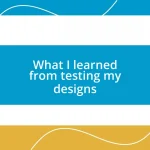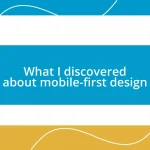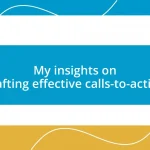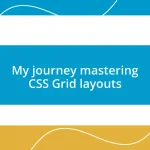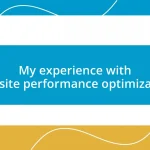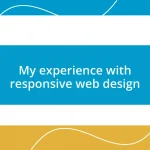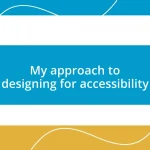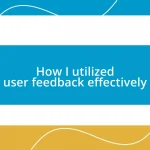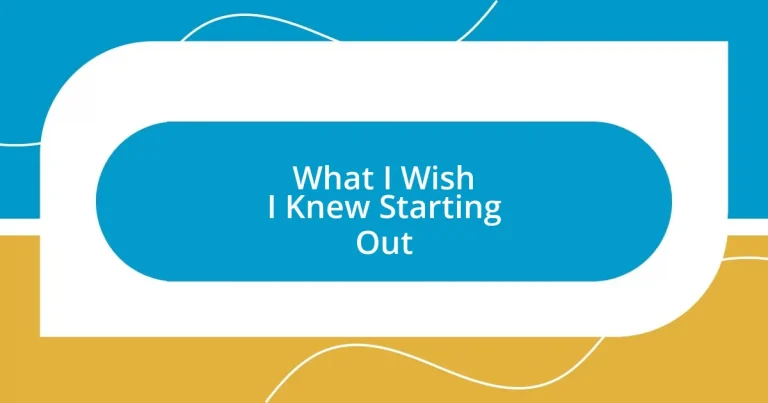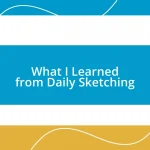Key takeaways:
- Embrace failure as a learning opportunity to build resilience and pave the way for future success.
- Networking is crucial; building relationships can open doors and provide valuable industry insights.
- Set realistic goals by breaking tasks into manageable steps to maintain motivation and track progress.
- Continuous learning enhances personal and professional growth, fostering collaboration and creativity among peers.
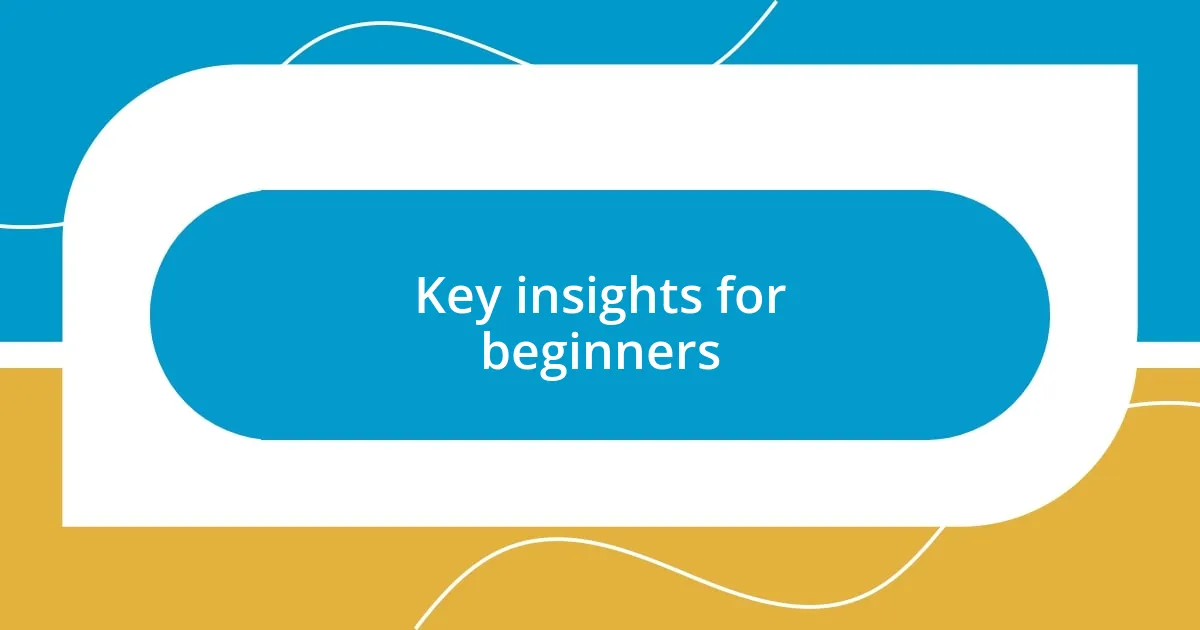
Key insights for beginners
When I first started out, I wish someone had told me how vital it is to embrace failure as a part of the journey. I remember a particular project I poured my heart into, only to have it flop spectacularly. It was painful, but looking back, that experience taught me resilience and the importance of learning from missteps. Isn’t it interesting how our biggest setbacks can actually pave the way for future success?
One insight that I found immensely helpful is the power of networking. Early in my career, I hesitated to reach out to others in my field, thinking I might be bothering them. But when I finally stepped out of my comfort zone and attended events or reached out via social media, I discovered how welcoming the community can be. Building relationships not only opened doors for me but also enriched my understanding of the industry. Have you ever considered how a single connection might change your trajectory?
Lastly, consistency cannot be overstated. In the beginning, I tried to juggle multiple ideas at once, thinking I needed to do it all. However, I soon realized that maintaining focus on one project at a time made a world of difference. The habit of showing up regularly and committing to my goals created momentum that I never could have achieved by spreading myself too thin. Have you thought about what you could achieve with just a little more focus and determination?
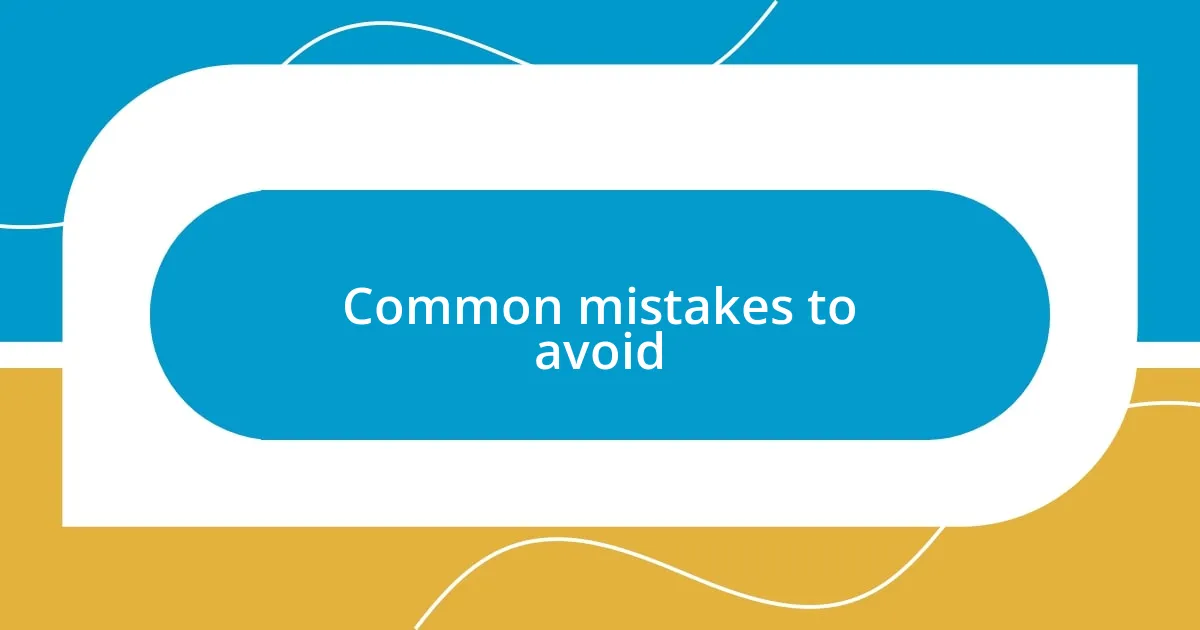
Common mistakes to avoid
When I reflect on my early days, one major mistake I often see budding professionals make is underestimating the importance of planning. I remember diving headfirst into projects, feeling that enthusiasm would carry me through. However, without a clear roadmap, I found myself lost, backtracking unnecessarily. It’s crucial to take a moment to chart a course before plunging into the depths of a new endeavor.
Another pitfall I’ve encountered is the tendency to compare oneself to others, particularly in the age of social media. I vividly recall scrolling through feeds filled with seemingly perfect stories and accomplishments, which left me feeling inadequate. I learned that everyone’s journey is unique, and comparing apples to oranges only breeds frustration. Focusing on my path and progress made a significant difference in my motivation and mental well-being.
Lastly, avoiding feedback is a mistake I wish I could have circumvented. Early on, I was reluctant to seek out critiques, fearing negative responses. But I discovered that constructive criticism is a gift—it gives clarity and direction. When I finally began inviting feedback, I was amazed at how it sharpened my skills and deepened my understanding. Engaging with others’ perspectives turned weaknesses into areas of growth.
| Mistake | Impact |
|---|---|
| Underestimating Planning | Leads to confusion and wasted effort |
| Comparing to Others | Creates self-doubt and hinders progress |
| Avoiding Feedback | Limits growth and skill development |
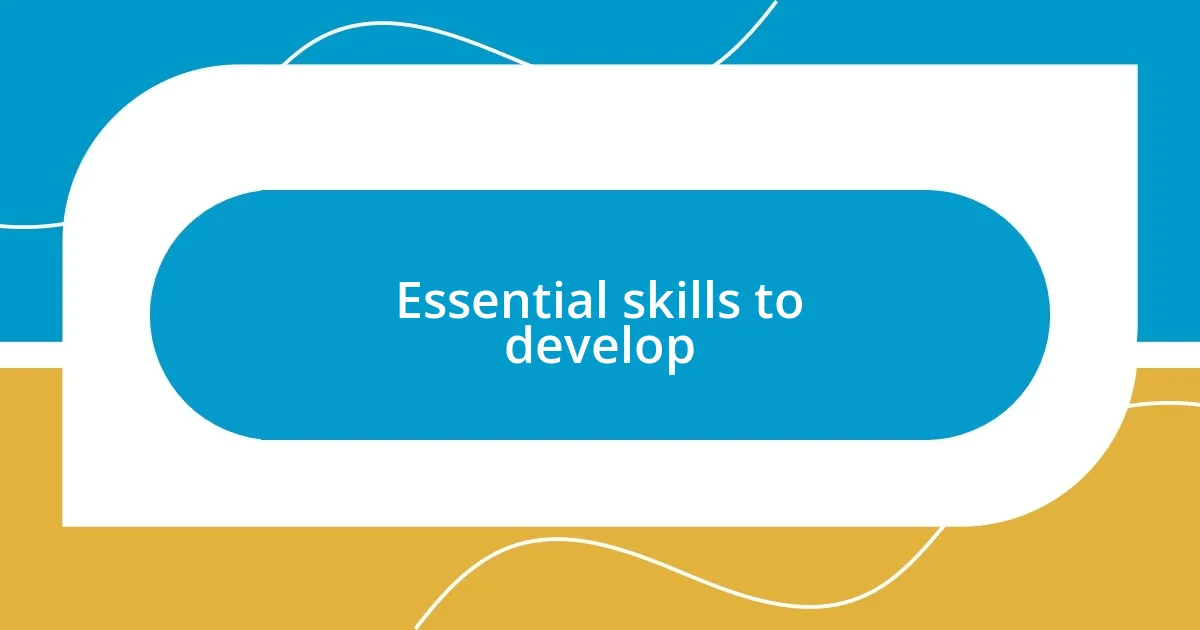
Essential skills to develop
Absolutely, developing essential skills can dramatically shape your early experiences. Over time, I’ve come to realize that communication is an indispensable skill. When I first started, I often assumed that delivering technical expertise was enough. However, I quickly learned that being able to articulate ideas clearly and persuasively can make or break your chances of success. I remember presenting my ideas to a client, feeling confident in my knowledge, but I could see their confusion on their faces. It hit me hard that technical skills alone didn’t translate to effective communication.
Here are some essential skills to focus on developing:
- Effective Communication: The ability to convey ideas and information clearly.
- Time Management: Prioritizing tasks to maximize productivity.
- Adaptability: Being flexible in the face of change or unexpected obstacles.
- Emotional Intelligence: Understanding your emotions and the emotions of others to improve interpersonal relationships.
- Problem-Solving: Analyzing situations to find effective solutions quickly.
As I reflect on my journey, I can’t stress enough the importance of learning how to collaborate. Early on, I felt the need to prove myself as a “lone wolf,” believing I had to tackle everything independently. This led to burnout, which was incredibly discouraging. It wasn’t until I embraced teamwork that I found true support and inspiration. Partnering with others not only helped me learn new perspectives but also fostered an atmosphere of shared success. When I started tapping into the diverse skill sets of my colleagues, I felt a weight lift off my shoulders. Collaboration is undeniably a powerhouse skill that can magnify results.
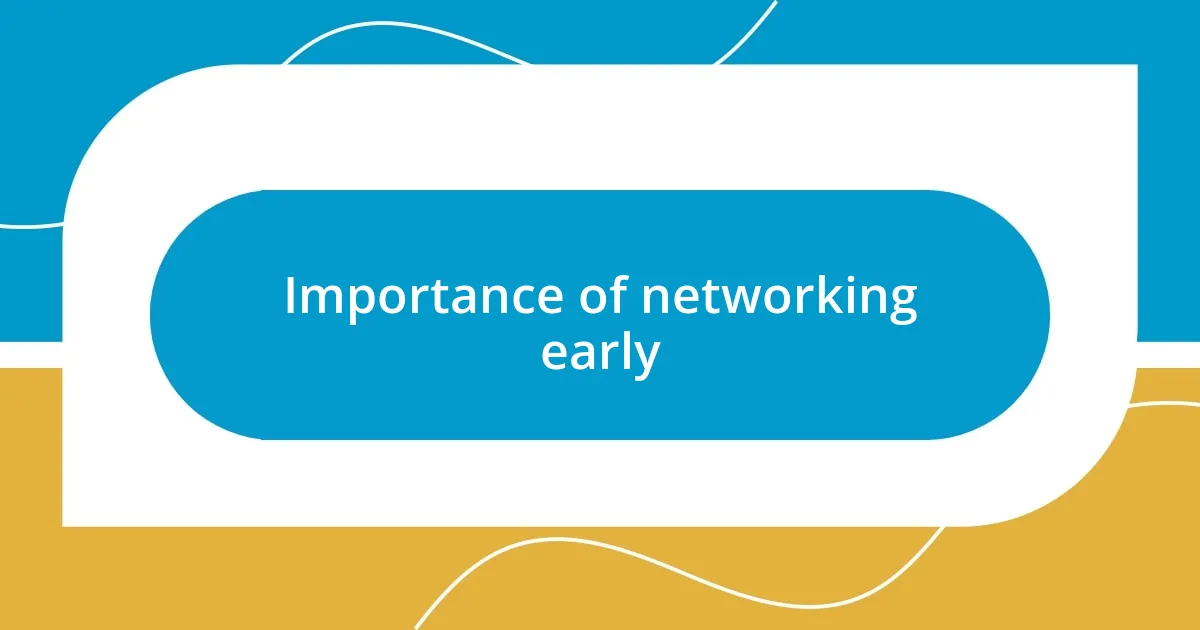
Importance of networking early
Building connections early in your career can make a world of difference. I distinctly remember my first networking event—nervous and unsure, I almost didn’t go. But when I finally stepped into that room, I found it buzzing with like-minded people ready to share experiences. It dawned on me then that these connections could open doors I didn’t even know existed. And the best part? Those initial conversations led to collaborations and opportunities that fundamentally shaped my path.
You might wonder why networking feels so daunting. I’ll be honest; it took me years to wrap my head around the idea that networking isn’t just about exchanging business cards. It’s about building relationships. In one instance, I reached out to someone I hadn’t spoken to in years, seeking advice on a project. That simple outreach reinforced a bond I hadn’t realized was so strong, allowing us both to grow from one another’s experiences. Engaging genuinely leads to unexpected support down the line.
Moreover, early networking can provide you with invaluable insights that you simply can’t get from textbooks or online courses. I recall a moment at a roundtable discussion where seasoned professionals shared their, often messy, paths to success. Hearing their stories highlighted the real challenges of the field and the creative solutions they employed. This isn’t just theory; it’s the raw, real deal. The earlier you immerse yourself in these conversations, the better prepared you’ll be for the hurdles you’ll encounter. So, why wait? Dive in and start connecting!
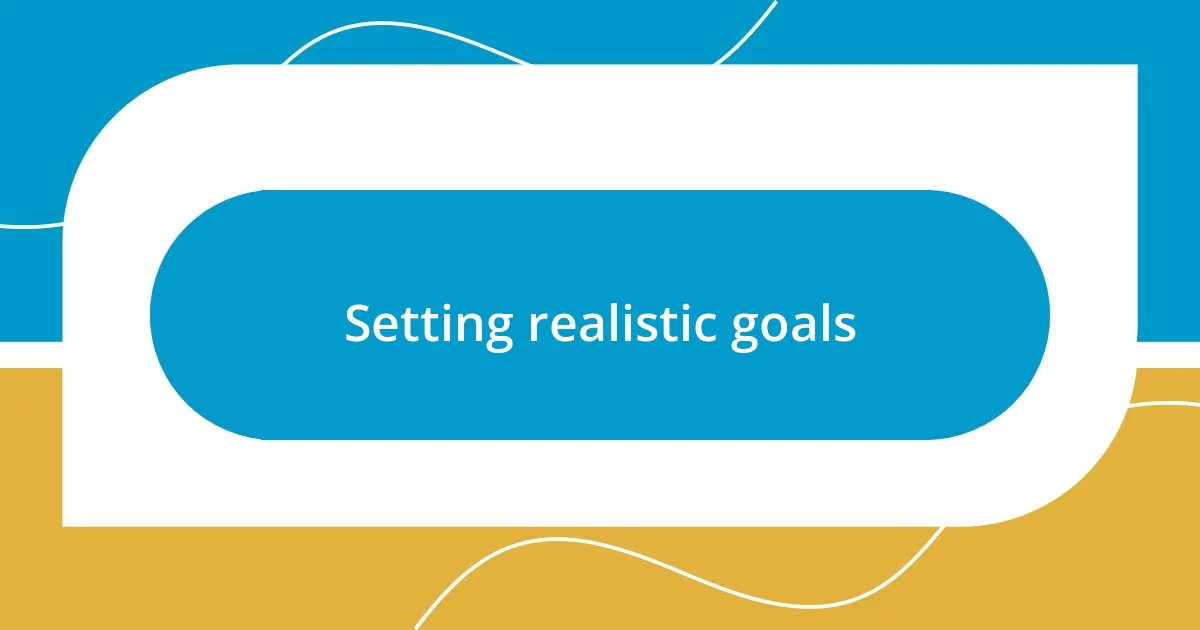
Setting realistic goals
Setting realistic goals is a vital step that I wish I had grasped earlier in my journey. When I first started out, I set lofty ambitions without breaking them down into manageable tasks. As a result, the frustration would build when I didn’t achieve everything at once. A friend once told me, “Focus on one step at a time, and celebrate the small victories.” That advice changed my perspective; it shifted my approach to goal-setting dramatically.
To illustrate, I remember embarking on a project that felt overwhelming right from the get-go. My eyes were on the final product, but I failed to see the importance of laying a solid foundation. I broke it down into smaller, measurable goals, like completing individual tasks weekly. Suddenly, what seemed impossible became achievable, and I found myself not only making progress but also enjoying the process. The sense of accomplishment after checking off each step was tremendous.
Have you ever felt overwhelmed by a big project? I learned that breaking down my goals not only made the workload feel lighter, but it also kept my motivation levels high. Now, I always ask myself, “What’s a realistic timeframe for this goal?” Approaching aims with this mindset has helped me maintain balance, while also pushing my limits gradually. Setting realistic goals truly empowers your journey, transforming seemingly daunting aspirations into manageable milestones that pave the way for success.
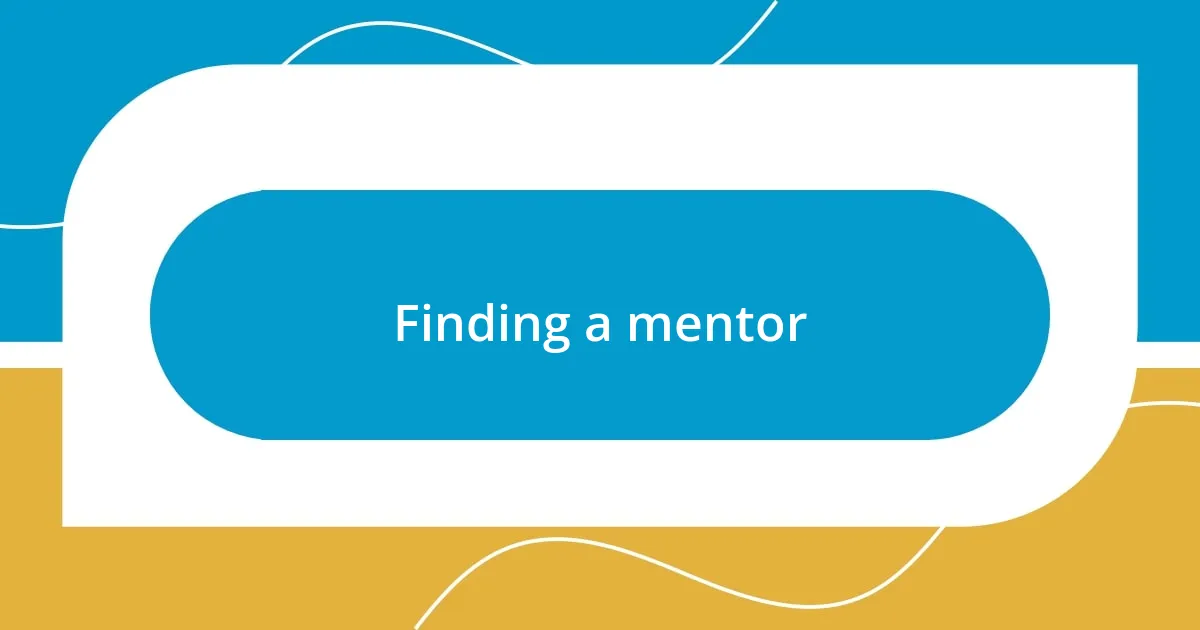
Finding a mentor
Finding a mentor can feel a bit like searching for a needle in a haystack, but the journey is well worth it. I distinctly remember when I first set out to find a mentor; I was filled with excitement but also a touch of anxiety. It was vital for me to identify someone whose path resonated with my aspirations. I reached out to a colleague from a previous job who seemed to have it all figured out. To my surprise, she was more than willing to share her experiences and insights. That first conversation was a game-changer—it opened my eyes to the importance of having someone guide you through unfamiliar waters.
What I found particularly enlightening was understanding that mentorship is a two-way street. During one of our coffee chats, I learned about her challenges, not just her successes. It struck me that a mentor isn’t just a source of knowledge but also a partner in your professional growth. Have you ever opened up to someone and found common ground? That shared vulnerability fosters such a strong connection, making the mentorship experience both enriching and empowering. It reminded me that everyone has struggled at some point, and learning from each other’s missteps is incredibly valuable.
I also came to appreciate the importance of being proactive in the mentor-mentee relationship. After several months, I decided to show my gratitude by sharing resources and insights that had helped me along the way. It felt rewarding to contribute back. How often do we think about giving rather than just receiving? This approach truly helped solidify our connection. If you’re starting out on your journey, don’t underestimate the profound impact a mentor can have. Just remember, it’s all about mutual growth—so seek someone who inspires you, and be prepared to engage fully in the relationship.
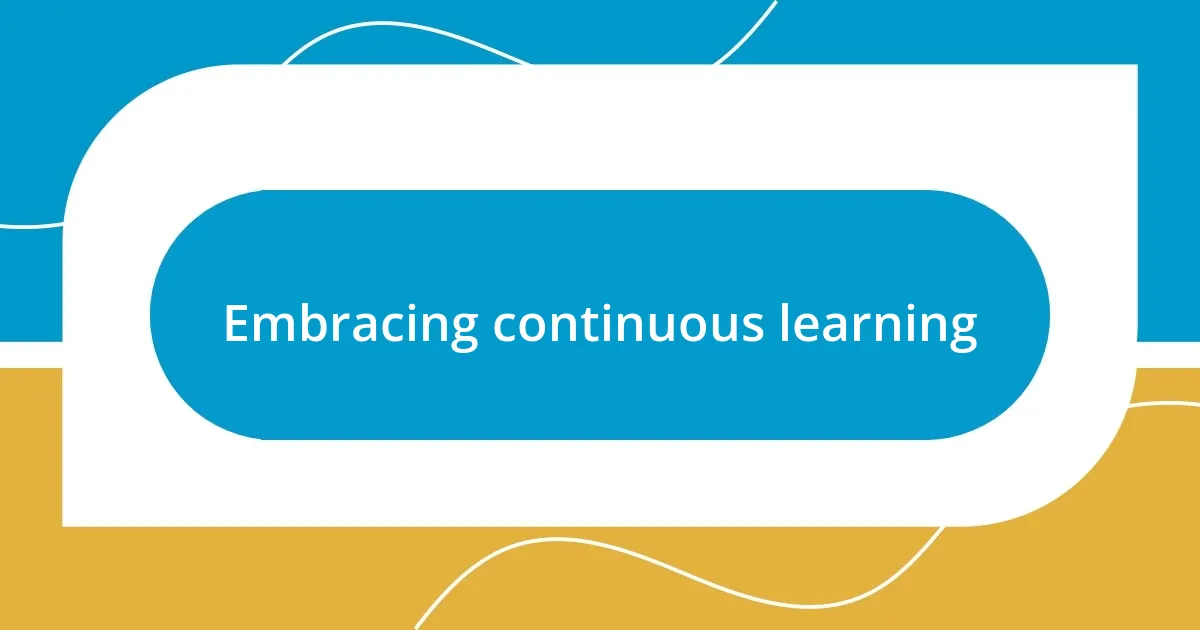
Embracing continuous learning
Embracing continuous learning is something that I wish I had prioritized from the start. Early in my career, I often felt like I had enough knowledge to get by, but it wasn’t until I faced unexpected challenges that I realized the importance of being open to new ideas and skills. I remember a particular project where I hit a wall; my existing knowledge wasn’t cutting it, and I felt stuck. It was then that I turned to online courses and workshops, immersing myself in topics that piqued my interest. Have you ever felt that rush when you learn something new? It’s exhilarating and necessary for growth.
Looking back, I can confidently say that my willingness to learn continuously has been a game-changer. There was a time when I hesitated to ask questions for fear of looking uninformed. However, I learned that every question is an opportunity for growth, and I eventually embraced that. Now, every workshop or seminar feels like a doorway opening to new possibilities. I remember one time after attending a conference where I absorbed a ton of fresh perspectives; I walked away not just with knowledge but also with renewed energy and motivation. Isn’t it incredible how just one experience can shift your entire outlook?
Moreover, I’ve seen how embracing continuous learning ripples through my professional relationships. When I started sharing insights from my learning journeys with coworkers, it led to invigorating discussions that sparked creativity and collaboration. I can’t help but wonder, have you experienced that uplifting moment when everyone around you starts brainstorming ideas together? It’s a beautiful reminder that learning is a shared adventure. By nurturing a mindset of continuous learning, you not only enhance your individual growth but also contribute to a thriving, collaborative environment. Embracing this journey has undoubtedly shaped the way I approach challenges and opportunities alike.

